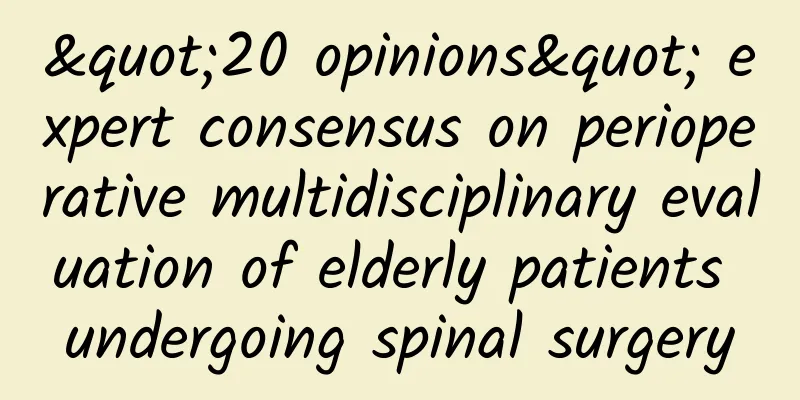"20 opinions" expert consensus on perioperative multidisciplinary evaluation of elderly patients undergoing spinal surgery

|
Compared with young and younger elderly people, elderly patients (>75 years old) have more special problems such as co-existing multiple diseases, multiple medications, and multiple organ dysfunction, which lead to increased difficulty in surgical decision-making, high intraoperative risks, high incidence and mortality of severe postoperative complications, and slow recovery process. In order to standardize the clinical pathway of multidisciplinary perioperative evaluation of elderly patients undergoing elective spine surgery, the National Clinical Research Center for Geriatric Diseases Geriatric Surgery Expert Group, the Beijing Medical Association Orthopedics Branch Geriatrics Group, and the Chinese Medical Association Anesthesiology Branch Geriatrics Anesthesiology Group experts based on evidence-based medicine and after repeated discussions, reached the "Expert Consensus on Multidisciplinary Perioperative Evaluation of Elderly Patients with Spinal Surgery" for clinical reference. This article will share 20 recommendations. Reference screenshot Recommendation 1 The education work starts after the patient is admitted to the hospital, and the orthopedic physicians and nursing team will educate the patient on the multidisciplinary team diagnosis and treatment model of elderly spinal surgery. Recommendation 2 Spine specialists develop surgical plans based on the elderly patient's symptoms and signs, routine preoperative examinations, multidisciplinary evaluation results, and the patient's and family's willingness to undergo surgery. They also discuss and develop a phased, individualized rehabilitation plan with the multidisciplinary team diagnosis and treatment model team to accelerate the patient's postoperative recovery. Recommendation 3 Routine preoperative examinations for elderly spinal patients measure bone density to assist in the development of intraoperative surgical plans. For osteoporosis patients, it is recommended that calcium supplements, vitamin D, and anti-osteoporosis drugs be used in combination after surgery. Patients should also undergo regular testing of serum 25-hydroxyvitamin D and blood calcium levels to assess the efficacy. Recommendation 4 Geriatricians use the Daily Living Activities Scale and the Daily Instrumental Activities Scale to assess the activity ability of elderly patients. For patients with a Daily Living Activities Scale score below 70 points and a Daily Instrumental Activities Scale score below 5 points, geriatricians will guide preoperative rehabilitation and early postoperative rehabilitation exercises. Recommendation 5 The Mini-Mental State Examination and the Montreal Cognitive Assessment were used as assessment tools. For patients with mild cognitive impairment as assessed by the Montreal Cognitive Assessment Scale and dementia as assessed by the Mini-Mental State Examination Scale, family members who are familiar with the patient's condition should be present and actively cooperate in the preoperative inquiry of the medical history. After surgery, it is recommended that the patient be treated in the Department of Neurology to assist in his or her rehabilitation. Recommendation 6 The Zung Anxiety and Depression Scale is used to assess anxiety and depression. For those screened to have mental problems, a neurologist or psychiatrist should be consulted before surgery to assist in diagnosis and treatment, and surgical treatment should be performed after the condition is under control. Recommendation 7 Before surgery, the anesthesiologist will routinely perform a risk assessment for postoperative delirium. For patients who are assessed as having a high risk of postoperative delirium, their mental and psychological state should be closely observed during the perioperative period. If necessary, psychologists and neurology doctors can be invited to make daily rounds to improve the early diagnosis rate and timely intervention. During surgery, attention should be paid to reducing bleeding, and low-flow oxygen should be continuously inhaled for 6 hours after surgery. For patients suspected of postoperative delirium, head CT examination should be combined to differentiate it from intracranial lesions and mental illness. Recommendation 8 Geriatricians use the FRIED criteria to conduct frailty assessments. For elderly patients who are assessed as frail, the pros and cons of surgery should be fully considered before elective spinal surgery, the relevant risks should be assessed, and relevant preoperative and postoperative exercise and nutritional intervention plans should be developed. For those with adequate mobility, resistance exercise and aerobic endurance exercise training can be achieved through bicycles, elderly exercises, elastic bands, etc. For elderly patients with normal liver and kidney function, the recommended daily protein intake for frail patients with sarcopenia is 1.2 g/kg. When the serum 25-hydroxyvitamin D level is 10 points, please ask gastroenterologists and geriatricians to jointly develop a specific intervention plan and re-evaluate the surgical risks based on the preoperative optimization results. Recommendation 12 Use the chronic kidney disease epidemiology collaboration to assess the patient's renal function. For patients at stage 4 and above, ask the nephrology, geriatrics, and pharmacy departments to jointly develop relevant intervention plans. If the patient develops hyperkalemia, metabolic acidosis, uremic pericarditis, significant azotemia, and hemodynamic instability, surgical treatment should be suspended and the patient should be referred to the nephrology department. Recommendation 13 It is recommended that elderly patients undergo routine intracranial vascular ultrasound and carotid artery ultrasound examinations after admission, and cranial CT, MRI or electroencephalogram examinations when necessary. Anesthesiologists use the Framingham Stroke Scale score to assess the risk of perioperative stroke in patients. For patients with a high risk of stroke according to the Framingham Stroke Scale, neurology and anesthesiologists should jointly develop perioperative intervention plans. Recommendation 14 Elderly spinal patients are routinely examined for glycosylated hemoglobin and glycosylated serum protein after admission, and endocrinologists are asked to assist in diagnosis and treatment for patients with poor blood sugar control. Recommendation 15 It is recommended that pharmacists guide elderly spinal patients in perioperative medication use and try to use the smallest dose to reduce related risks. Recommendation 16 It is recommended that elderly patients have routine blood tests and complete biochemical tests upon admission to the hospital. For those who plan to undergo open spinal surgery, regular oral protein powder supplementation should be performed during the perioperative period. For high-risk patients, please have hematologists and nutritionists assist in diagnosis and treatment and develop specific prevention and treatment plans. Recommendation 17 It is recommended that elderly patients undergo routine laboratory coagulation function tests, D-dimer tests, and lower limb vascular ultrasound upon admission. For high-risk patients, vascular surgeons and anesthesiologists are requested to assist in diagnosis and treatment. Recommendation 18 It is recommended that elderly patients be screened using the visual analogue scale and numerical rating scale by a team of orthopedic doctors and nurses after admission, and that orthopedic and anesthesiologists provide guidance on the perioperative multimodal analgesia plan. Recommendation 19 It is recommended that elderly patients undergo preoperative anesthesia evaluation by an anesthesiologist after admission to the hospital, summarize the conclusions of multidisciplinary evaluations, comprehensively evaluate the patient's surgical risks, and provide guidance to orthopedic surgeons. Recommendation 20 It is recommended that the nursing team conduct comprehensive nursing assessments on elderly patients and assist the multidisciplinary team diagnosis and treatment model team for the elderly to carry out corresponding education, provide key care for high-risk patients, and provide guidance on medication and rehabilitation treatment after discharge to patients and their families. References: Geriatric Anesthesiology Group of the Anesthesiology Branch of the Chinese Medical Association, Geriatrics Group of the Orthopedics Branch of the Beijing Medical Association, National Clinical Research Center for Geriatric Diseases. Chinese expert consensus on perioperative multidisciplinary evaluation of elderly patients undergoing spinal surgery[J]. Chinese Medical Journal, 2022, 102(17): 1245-1257. |
<<: Can regular blood donation really “detoxify” you?
>>: [Fat Bear Science] What are the characteristics of people who are prone to cancer?
Recommend
Width of lateral ventricle at 24 weeks of pregnancy
Products are the hope of every family, but not ev...
What fruits can girls eat when they have their period?
During menstruation, women's bodies will feel...
Why do animals have different sleeping postures? How do monkeys sleep?
Friends who often watch the animal world must hav...
What is the best childbearing age for women?
Women shoulder the important task of human reprod...
Can pregnant women use air conditioning?
It is said that pregnant women cannot use air con...
Can I get tetanus during pregnancy?
During pregnancy, pregnant women should not only ...
What is scallop skirt? Can scallop skirt be eaten?
The scallop skirt is also called the scallop edge...
How to calculate the ovulation period for women
In fact, women's ovulation period is usually ...
How to relieve stomach pain during menstruation
Menstruation is a big ordeal for every girl, incl...
Stages and symptoms of pressure injuries
Pressure injuries, also known as bedsores or pres...
What medicine is used for vaginal ulcer pain
Vulvar ulcer is a relatively common gynecological...
What are the items in women’s health check-up?
Women's health is very important. Regular phy...
Is it accurate to use test strips to determine whether a boy or girl is a boy?
Many people's first reaction after they get p...
Can I eat mung bean porridge during dysmenorrhea?
Dysmenorrhea is too painful, and many girls can&#...









